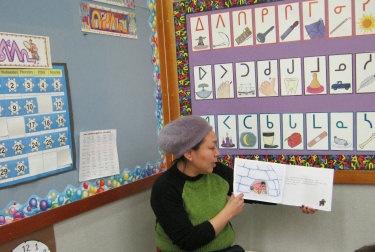The debate this week reinforced again for me how different Nunavut’s education system is from Saskatchewan’s, and arguably from the rest of Canada. Not only are we vastly different in the technology that is available and used within our schools, but also in the relationships we have with private corporations.
In Nunavut there is a lack of school-corporation partnerships and given how ubiquitous these partnerships seem to be elsewhere in Canada I think that it is worth exploring why we seem to be mostly free from the grasp of these corporations. I think that it can be attributed to in-congruency between the values of the education system and the products offered by the corporations.

Photo Credit: skylarhodder via Compfight cc
Nunavut, which means our land in Inuktitut, was created in 1999 after separation from the Northwest Territory. Since Nunavut’s creation, changes have been made to the education system it inherited from the NWT to provide more local control over policy decisions regarding curriculum and programming. These changes “offered Inuit the opportunity to envision their own system of education.” The system of education that was envisioned and that became the focus for the Department of Education was one in which Inuit societal values and cultural traditions were the foundation. To ensure the implementation of this vision, the Department of Education developed the Inuit Qaujimajatuqangit: Education Framework for Nunavut Curriculum and the Ilitaunnikuliriniq: Foundation for Dynamic Assessment. The government of Nunavut reinforced the importance of education being founded on Inuit societal values by enacting it as law in the Nunavut Education Act.
The dialogue around education in Nunavut was focused on creating curriculum and resources that were founded on Inuit societal values. During this time, there was very little that partnerships with corporations could offer as there were no private organisations specializing in education resources founded on Inuit societal values.
In the last couple years there has been a slightly new dialogue taking place within the Department of Education. While Inuit societal values remain as a foundation for education, new words such as accountability, standardization, and benchmarks are entering the conversation. A year ago, the Fountas and Pinnell levelled reading program was implemented in Nunavut schools and Inhabit Media, the only publishing company in the Canadian Arctic, was contracted by the Department of Education to produce levelled readers in Inuktitut for the schools. So as Nunavut shifts slightly away from focusing on Inuit culture and societal values as the important foundation for education and looks to follow suit with other Canadian jurisdictions in terms of focusing on accountability and standardization, will we see more partnerships with private corporations? If we do, I hope that our remoteness, small population size, and the cost and difficulty associated for companies to produce materials in syllabics will limit the extent of these partnerships. What I think will save us from the stranglehold of these corporations is a strong sentiment among the majority of Nunavummiut that we need to do things a little differently here.
Something else that might save us from this Faustian bargain currently plaguing the United States and making its way into southern Canada, is that we always seem to be a little behind the times in Nunavut! In this case it might actually be to our advantage as we can learn from other jurisdictions in terms of the positives and negatives of school-corporation partnerships.
One area in particular that I hope Nunavut pays close attention to is the business of standardized testing. During the debate, the agree team shared some shocking information about the profits that Pearson makes from these tests and that they make even more profits when students are unsuccessful in passing the tests. This is very concerning, especially when you consider the criticisms that Alfie Kohn has made of standardized testing.
I think it is important to remember that corporations are not altruistic; they are in this education market to make a profit. Consider Google’s Quake Relief Hope Schools in China and the fact that Google is tracking students with some of its products. Given the population of China, there is potential for a huge education industry there. So is Google opening these schools out of the goodness of their heart or do they have an ulterior motive? Now I’m not saying that these schools are not beneficial, I’m just saying that we need to think carefully about the partnerships we enter into. It is important that we do not lose sight of the foundational values that our education systems are founded on when we enter into partnerships. As Audrey Watters’ said during our class last night, we need to always ask ourselves whose interests are being served by the educational technology and how this innovative technology is redefining the purpose of schools. If the technology is not congruent with the foundational values of our education system, then we need to evaluate the appropriateness of the partnership.
So to finally get to answering the debate question of whether public education has sold its soul to corporate interests in what amounts to a Faustian bargain, I would say that for Nunavut we have not. Whether this is due to a conscious choice to not implement technologies that are incongruent with the foundational values of Nunavut’s education system or that we are not a profitable market for these corporations is unclear. I wonder if First Nations schools in Saskatchewan are similar to the schools in Nunavut in terms of having societal values as a foundation to education. If they are similar, it would be interesting to see if there is a difference between Saskatchewan First Nations and non-First Nations schools in terms of the type and extent of partnerships with private corporations.

Love the alternate perspective and comparison to SK. It almost seems “untainted” by corporations up there, which is refreshing. However, when the societal values overlap with the resource accumulation, is this still a problem? As teachers is the greater foundational value ‘student learning’ and is it okay to go through corporations to achieve this??
Great question Logan and there is a lot of debate here currently on whether it’s possible to focus too much on Inuit qaujimajatuqangit or IQ (societal values) that it could actually become detrimental to student learning because of a lack of focus on accountability and standardization in education. I’m hesitant to pass judgment on whether there is “too much” IQ here because I am cognizant of my place in Nunavut and of not wanting to be another “southerner” that comes here and tells Inuit what would be best for them. That being said I believe that a purpose of education should be about preparing children to become contributing members to society and since that society will involve technology we need to be providing access to tech to students. This is where I see that we can benefit from partnerships with private corporations – to increase our bandwidth, provide assistive technology to help the high numbers of students with hearing impairments that we have, engage and motivate kids to attend school. I guess I’m focused on addressing more of our basic needs with technology. Do you think that these basic tech needs have to be addressed first or is it limiting the potential to not be also thinking beyond these needs to even greater innovation that could be possible with private corporations? Would these partnerships end up being another form of colonization or could they provide tools that aid in the journey of Inuit towards self-determination in the Arctic? I’m very much on the fence!
Hey! I used Alfie Kohn too!
I think it’s really interesting how Nunavut seems to be in isolation in regards to its development of education: maintaining indigenous education as a cornerstone has been somewhat of an afterthought in the grand scheme of Saskatchewan education.
I have really appreciated your perspectives throughout the semester as they provide a unique view on education that we don’t often hear very much of because of, as you mentioned, isolation, distance, and technological availability.
Great blog post! It is an interesting perspective when geographical location plays a factor in regards to corporate partnerships. I also wonder about First Nations schools in Saskatchewan and if their situation is similar to Nunavut’s as you’ve describe. Thank you for sharing!
Interesting read Ainsley – thanks for posting 🙂 angela
You always bring such a unique perspective to these debate topics. Thank you for sharing your northern experiences with us. It’s important to remember that Canada, and the education systems within this great country are vastly different. I’m interested to see if corporate interest increases in northern communities over the next years and how this impacts the Inuit societal values.
Pingback: Critical Friends or Critical Frenemies? | E. Therrien